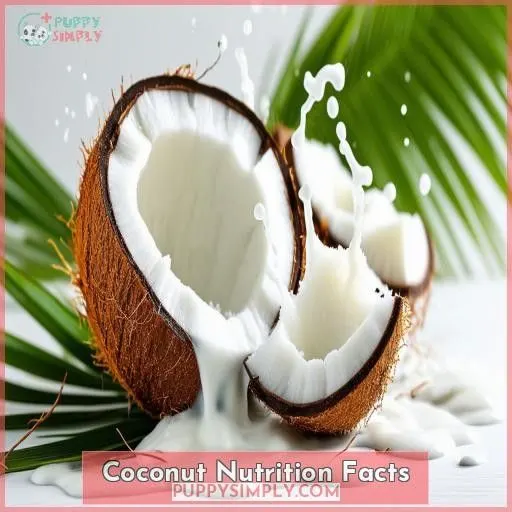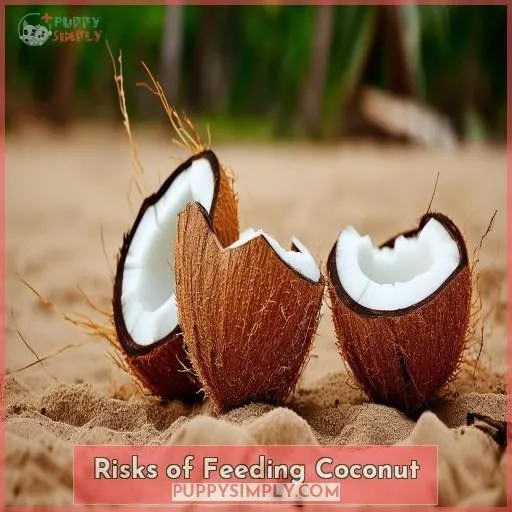This site is supported by our readers. We may earn a commission, at no cost to you, if you purchase through links.
 You might be wondering, "Can dogs eat whole coconuts?"
You might be wondering, "Can dogs eat whole coconuts?"
The answer isn’t a simple yes or no.
While coconut offers amazing benefits like healthy fats, fiber, and vitamins, feeding your furry friend whole coconut can lead to tummy troubles or worse.
Coconut meat and husk present choking hazards, and the high fat content may trigger pancreatitis.
However, you can safely share coconut products like oil, flour, or unsweetened milk.
Start slowly, and consult your vet if Fido shows any adverse reactions.
Want to learn more about incorporating coconut into your pup’s diet?
Let’s dig deeper.
Table Of Contents
Key Takeaways
- While coconut offers incredible benefits like healthy fats, fiber, and vitamins, you’ve got to be cautious about giving your furry friend whole coconuts. Those hard shells and high-fat content could leave Fido with some gnarly tummy troubles or even pancreatitis.
- But fear not! You can still spoil your pup with coconut goodness by serving up coconut oil, flour, or unsweetened milk. Just introduce it slowly and keep an eye out for any adverse reactions – you don’t want your pup feeling like they got hit by a coconut after indulging.
- When it comes to feeding Fido coconut, moderation is key, my friend. Too much of a good thing could lead to digestive issues or even weight gain. Imagine your pup trying to chase a squirrel with a coconut belly – not a pretty sight!
- If you’re unsure about introducing coconut into your dog’s diet, don’t be a lone wolf. Chat with your trusty vet first, especially if your pup has any health issues. They can guide you on safe portions and alternatives to ensure your furry pal reaps all the coconutty benefits without any coconutty consequences.
Can Dogs Eat Whole Coconuts?
No, dogs shouldn’t eat whole coconuts. The tough outer shell and thick inner husk can pose a choking hazard and digestive issues for dogs.
Can Dogs Eat Coconuts?
You might be wondering, "Can dogs eat whole coconuts safely?" The answer is a bit complicated. While coconut meat, oil, and water can provide some nutritional benefits for dogs in moderation, the tough outer shell poses a serious risk. Coconut shells are hard and indigestible, potentially causing intestinal obstructions or teeth damage if chewed. So it’s best to avoid giving your pup whole coconuts.
However, you can offer dogs coconut meat, oil, or water in moderation as an occasional treat. Just be mindful of any coconut allergies or sensitivities your dog may have. Introduce coconut products slowly, and watch for signs of gastrointestinal upset. When in doubt, consult your veterinarian about safe ways to incorporate coconut into your dog’s diet.
Coconut Nutrition Facts
You’re wise to contemplate coconut’s nutrient profile before feeding it to your dog. Coconuts are abundant in fiber, healthy fats like medium-chain triglycerides, and essential vitamins and minerals that can enhance a dog’s overall well-being.
Fiber Content
You’ll be glad to know that coconuts are a great source of fiber. This fiber aids digestion and nutrient absorption, promoting gut health and regularity. Coconut flour, flesh, and flakes all offer decent fiber content, helping prevent gastrointestinal problems in dogs.
Healthy Fats
You can reap the benefits of the healthy fats in coconuts. They’re rich in medium-chain triglycerides (MCTs) like lauric acid, which has:
- Anti-viral and antimicrobial properties
- Ability to boost metabolism and energy levels
- Anti-inflammatory effects
- Potential to improve brain function
Vitamins and Minerals
You’ll be delighted to know coconuts are packed with vitamins C, E, B1, B3, B5, and B6, along with minerals like iron, selenium, sodium, calcium, magnesium, and phosphorus. These essential nutrients boost your pup’s immune system, promote healthy skin, and may even help prevent heart disease and regulate blood pressure.
Health Benefits of Coconut
Coconut boasts impressive anti-inflammatory properties that may soothe your dog’s skin and enhance their coat’s luster. Its digestive-friendly fiber also supports a healthy gut, promoting overall well-being from the inside out.
Anti-inflammatory Properties
You’ve likely heard coconut has anti-inflammatory effects. In dogs, it may help with:
- Joint pain and arthritis
- Boosting the immune system
- Allergies or dry, itchy skin
- Stomach upset or poop problems
Coconut’s anti-inflammatory properties offer relief for many conditions.
Skin and Coat Health
You’ll be glad to know coconut’s anti-inflammatory properties also benefit your dog’s skin and coat health. It can soothe hot spots and other skin conditions while promoting a shiny, healthy coat, as shown in this table:
| Benefit | Explanation |
|---|---|
| Moisturizes Skin | Reduces dryness and itchiness |
| Soothes Inflammation | Calms redness and irritation |
| Promotes Coat Health | Leaves fur soft and glossy |
Digestive Support
Coconut’s high fiber content and medium-chain triglycerides can aid digestion too. These anti-inflammatory effects promote healing in your dog’s gut while regulating energy provision. A soft coat and healthy skin are signs your pup’s benefitting from coconut’s digestive support.
Risks of Feeding Coconut
While coconut offers some potential benefits for dogs, it’s imperative to be aware of the risks. Feeding too much coconut or whole coconuts can lead to gastrointestinal issues like diarrhea and vomiting, pancreatitis from the high fat content, or even allergic reactions in some dogs.
Gastrointestinal Issues
While coconut offers benefits, you should be cautious. Indulging your pup with:
- Raw coconut flesh or milk
- Excessive Coconut water (high potassium)
- Large portions
…can lead to gastrointestinal upset like diarrhea or vomiting due to lacking the proper digestive enzymes.
Pancreatitis
You should also watch out for pancreatitis, as coconuts contain medium-chain triglycerides (MCTs) and saturated fats that can be problematic for dogs with lipase deficiency. Too many MCTs and fats can trigger an inflamed pancreas, leading to vomiting, diarrhea, and abdominal pain.
Allergic Reactions
While coconut offers health benefits, you must watch for allergic reactions like skin irritation or digestive upset. Introduce coconut gradually and monitor your pup closely to guarantee their safety.
Safe Coconut Products
While whole coconuts aren’t recommended for dogs due to the potential risks of intestinal obstruction and gastrointestinal upset, safer options like coconut oil, coconut flour, and Coconut milk can provide nutritional benefits when fed in moderation. These coconut products are rich in healthy fats, fiber, and other beneficial nutrients that may support your dog’s skin health, digestion, and overall well-being.
Coconut Oil
You’re in luck – coconut oil is a safe option for your pup! It’s rich in medium-chain triglycerides and boasts anti-viral properties. Apply it topically to aid wound healing or use it as an energy source in their diet.
Coconut Flour
Coconut flour is another safe coconut product for dogs. It provides fiber, healthy fats, and protein. You can use it to make dog treats or mix it into their regular food. Just be mindful of portion sizes, as too much can lead to digestive upset.
Coconut Milk
Another coconut product you can share with your pup? Coconut milk! This nourishing beverage contains electrolytes for hydration and antimicrobial properties. For dogs, opt for unsweetened varieties and offer in moderation alongside a balanced diet. However, the high-fat content may cause upset stomachs, so introduce slowly.
Serving Coconut to Dogs
When introducing coconut into your dog’s diet, it’s important to provide appropriate portions based on your pet’s size and needs. Proper preparation methods, such as grating or chopping the coconut meat into small pieces and removing any hard outer shells, guarantee safe consumption and prevent potential digestive issues.
Appropriate Portions
For coconut treats, limit your pup to 1-2 tsp Coconut oil or 1-2 tbsp coconut flour/milk per 20 lbs body weight. Too much can cause diarrhea or pancreatitis. Monitor closely when introducing new foods, consulting your vet first for dogs with health issues.
Preparation Methods
After determining safe portions, you’ll want to prepare coconut properly before feeding it to your pup. Grate or chop fresh coconut meat, avoiding the hard outer shell. Coconut water and supplements capitalizing on coconut’s anti-inflammatory properties offer healthy alternatives too.
Coconut Treats
If you want to treat your pup with coconut, coconut treats are a great option! Look for high-quality coconut dog treats without added sugars or preservatives. Coconut water and unsweetened coconut milk can also be given in moderation as a rejuvenating treat, but watch for potential coconut allergies.
Precautions and Considerations
While coconut can offer some beneficial nutrients for dogs, it’s important to consult your veterinarian before introducing it to your pet’s diet, as every dog may react differently. Closely monitor your furry friend for any adverse reactions like gastrointestinal upset or allergic symptoms, and remember, moderation is key in terms of adding new foods to their meals.
Consulting a Veterinarian
You should always consult your veterinarian before introducing coconut to your dog’s diet. They can advise if coconut is suitable based on your pup’s health, identify any potential coconut allergy, and recommend healthy coconut alternatives if needed.
Monitoring for Reactions
You should also monitor your dog closely after introducing coconut products. Watch for potential benefits like improved skin and coat, but also any negative effects like digestive issues. Follow feeding guidelines from reputable sources and consult your vet about safe alternatives and dosage recommendations if needed.
Moderation is Key
You should also keep in mind that moderation is key when feeding coconuts to your dog. While coconuts offer benefits, they’re high in:
- Fat
- Calories
- Fiber
Overconsumption can lead to issues like obesity, pancreatitis, and gastrointestinal upset. To prevent coconut allergies, start with small portions and monitor your pup’s reaction.
Frequently Asked Questions (FAQs)
How much coconut is safe for dogs?
While beneficial, coconut’s high fat can upset stomachs. Give small amounts grated or chopped, mixed into food – no more than 1-2 teaspoons per 10 lbs body weight daily.
Can puppies eat coconut?
You shouldn’t feed puppies whole coconuts. They’re a choking hazard and high in fat, which can upset their delicate digestive systems. Once fully grown, small amounts of shredded coconut can be an occasional treat, but it’s not essential for their diet.
Is coconut oil good for dogs coat?
Yes, coconut oil is great for dogs’ coats! It’s full of fatty acids that moisturize dry, itchy skin and promote a soft, shiny coat. Just use a small amount, as too much can cause digestive issues.
Are coconut treats safe for dogs?
Coconut treats are generally safe for dogs, but in moderation – that mound of treats could leave your pup feeling like a beached whale! Look for unsweetened varieties without additives for a healthy, occasional indulgence.
Can coconut help with dogs weight management?
Yes, coconut can aid weight management in dogs. Its fiber promotes feeling full, while its medium-chain triglycerides boost metabolism for healthy weight loss. However, moderation is key due to coconut’s high fat content.
Conclusion
While the furry question "can dogs eat whole coconuts?" requires some caution, offering your pup coconut products safely can benefit their health.
With moderation, coconut oil, flour, or milk provide fiber, healthy fats, and vitamins.
Slowly introducing these, monitoring reactions, and consulting your vet guarantee Fido reaps the rewards without tummy troubles.
Embracing coconut’s versatility allows you to treat your canine companion responsibly.













